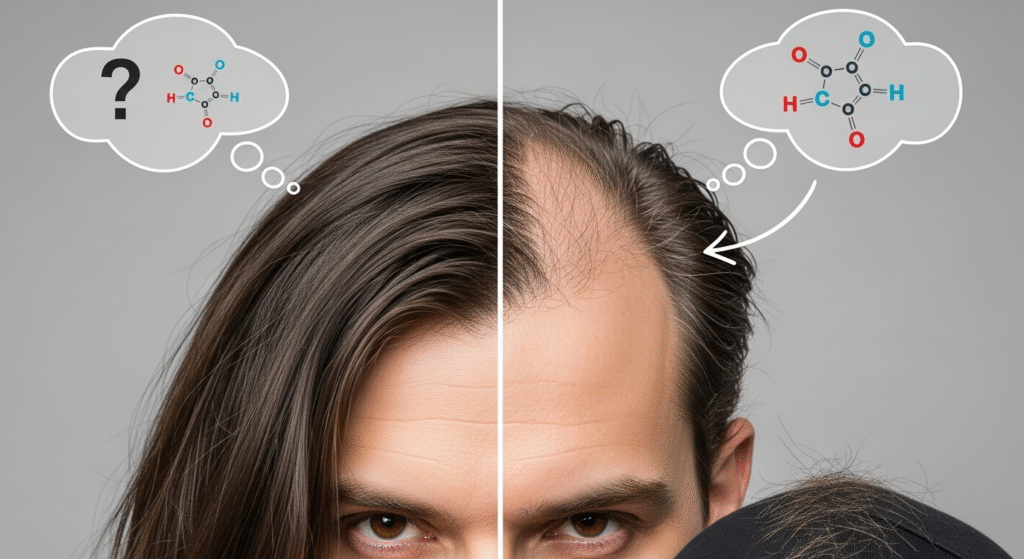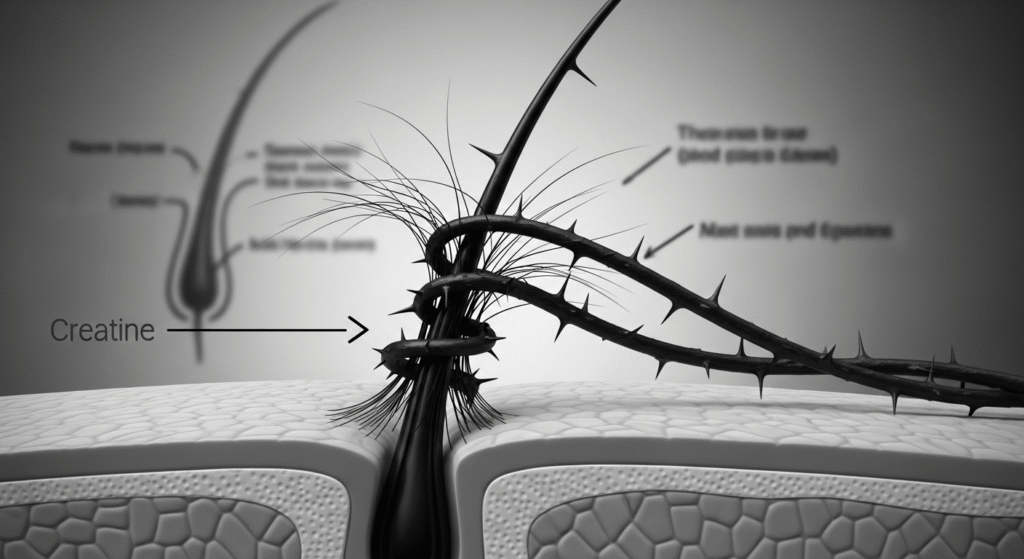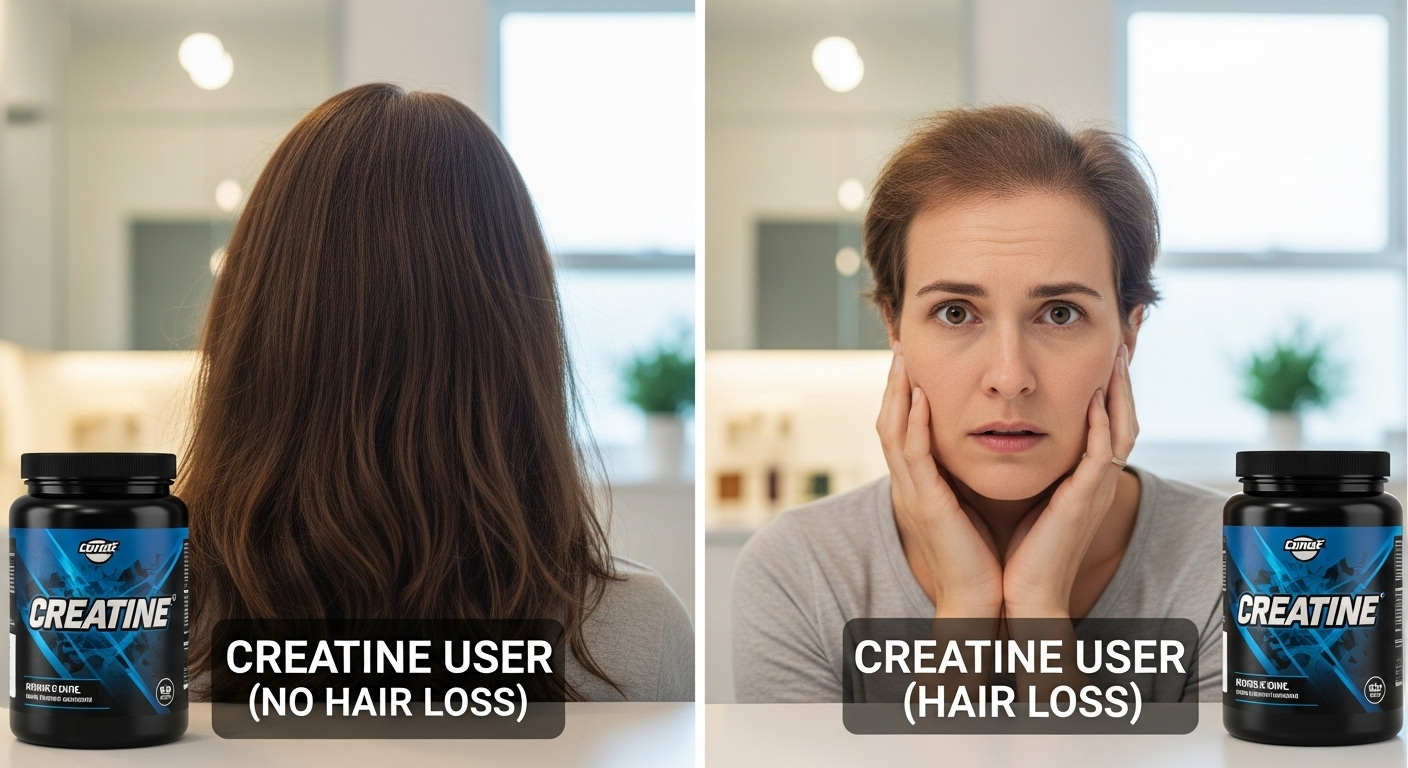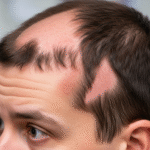Summary: Creatine is a popular supplement among athletes and fitness enthusiasts, but many wonder whether it could contribute to hair loss. In this article, we explore the science behind Does Creatine Cause Hair Loss, look at the research on creatine and DHT levels, and provide expert advice on using creatine safely. You’ll also find practical …
Summary:
Creatine is a popular supplement among athletes and fitness enthusiasts, but many wonder whether it could contribute to hair loss. In this article, we explore the science behind Does Creatine Cause Hair Loss, look at the research on creatine and DHT levels, and provide expert advice on using creatine safely. You’ll also find practical tips and FAQs to help clear up any confusion about creatine and hair loss.

Table of Contents
Introduction:
Creatine is widely recognized as one of the most effective performance-boosting supplements for athletes and bodybuilders. However, a common concern among users is whether it causes hair loss. In this article, we’ll break down the myths, look at the research, and discuss whether creatine has any real impact on hair growth. By the end, you’ll have the clarity you need to use creatine confidently, without worrying about hair thinning.
What Is Creatine?
Creatine is a naturally occurring compound found in small amounts in foods like red meat and fish. It plays a critical role in energy production, particularly during high-intensity exercise. Many athletes and bodybuilders take creatine supplements to boost their muscle mass, strength, and exercise performance.
How Creatine Works in the Body:
Creatine works by replenishing the energy stores in your muscles, specifically ATP (adenosine triphosphate), which fuels muscle contractions. This helps you perform more reps, lift heavier weights, and recover faster. As a result, creatine is a go-to supplement for anyone looking to improve strength and muscle growth.
The Link Between Creatine and Hair Loss: Myths vs. Facts
What the Research Says About Creatine and Dihydrotestosterone (DHT)
Dihydrotestosterone (DHT) is a hormone derived from testosterone, and it’s commonly linked to hair loss, particularly male-pattern baldness. Some studies suggest that creatine supplementation may increase DHT levels, which in turn could accelerate hair loss in individuals genetically predisposed to it. A key study from 2009 found that creatine supplementation increased DHT levels in rugby players, raising concerns about its link to hair thinning.
However, it’s important to note that these findings are based on a small sample size, and more research is needed to establish a definitive connection between creatine and hair loss.
Is There Scientific Evidence of Creatine Leading to Hair Loss?
While the idea of creatine causing hair loss remains debated, there is no conclusive scientific evidence that directly links creatine to permanent hair thinning. Most research is limited, and many studies have not focused on long-term use or diverse populations.
Why Do People Believe Creatine Causes Hair Loss?
The Popularity of the DHT Theory
The theory linking creatine to hair loss centers on the belief that higher DHT levels are detrimental to hair follicles. Since DHT is known to shrink hair follicles, people fear that increased DHT due to creatine use could cause premature hair thinning. However, this theory has not been conclusively proven, and individual results may vary.
Misconceptions About Creatine and Hormonal Changes
Much of the belief that creatine causes hair loss stems from online forums and anecdotal reports. Without solid scientific evidence, it’s easy to see how myths about creatine and hair loss persist. Many users believe that any noticeable hair thinning must be a direct result of creatine use, but this overlooks other factors like genetics, diet, and stress, which all play a significant role in hair health.
Expert Opinions and Case Studies
Does Creatine Cause Hair Loss
Many experts, including nutritionists and dermatologists, agree that creatine does not significantly contribute to hair loss. “While some individuals may experience temporary side effects, including changes in hair texture or growth, the long-term risk of hair loss from creatine is minimal.” Most experts advise users to monitor their own bodies and consult with a healthcare professional if they have concerns.
Case Studies and Personal Experiences
Personal stories from creatine users vary. Some report no hair thinning or changes, while others claim they experienced noticeable thinning after starting creatine. It’s important to recognize that everyone’s body reacts differently to supplements, and genetics plays a critical role in how individuals will respond to creatine.
How to Safely Use Creatine Without Worrying About Hair Loss

Tips for Responsible Creatine Use
If you’re concerned about the potential effects of creatine on your hair, consider the following tips:
- Cycle Creatine: Use creatine for 8-12 weeks, followed by a break of 4-6 weeks to reduce any potential side effects.
- Stick to Recommended Dosages: Avoid excessive use, as higher doses may increase the risk of side effects.
- Monitor Your Hair Health: Keep an eye on any changes in your hair texture or growth. If you notice significant changes, stop using creatine and consult a dermatologist.
Other Factors Contributing to Hair Loss
Remember, hair loss can be caused by a variety of factors beyond creatine supplementation:
- Genetics: Male-pattern baldness is the most common cause of hair loss and is influenced by your family history.
- Diet: A lack of nutrients such as iron, zinc, and biotin can affect hair health.
- Stress: Chronic stress can contribute to hair thinning by affecting the hair growth cycle.
FAQs
Can Creatine Cause Permanent Hair Loss?
No, there is no scientific evidence to suggest that creatine causes permanent hair loss. Any hair thinning observed is likely temporary and linked to other factors.
Should I Stop Taking Creatine if I’m Concerned About Hair Loss?
If you’re worried about hair loss, consider lowering your dosage or cycling your creatine use. If you notice significant hair thinning, consult a healthcare professional for guidance.
Are There Any Creatine Alternatives for Hair Health?
If you are concerned about hair loss but still want to boost your performance, try other supplements like beta-alanine or branched-chain amino acids (BCAAs), which do not affect DHT levels.
Conclusion
The Final Verdict on Creatine and Hair Loss
Based on current research and expert opinions, creatine does not appear to directly cause hair loss in the vast majority of users. While some individuals may see temporary changes in hair growth due to hormonal fluctuations, there is no solid evidence linking creatine to permanent hair thinning. If you’re concerned about this, consult with a healthcare professional and monitor your body’s response to creatine.
Ready To Take Your Next Step
If you have more questions or need personalized advice on using creatine, book a consultation with Dr. Rana Irfan, a leading expert in hair and scalp health. Ensure you’re making the right choices for both your fitness and hair health.






